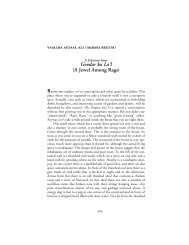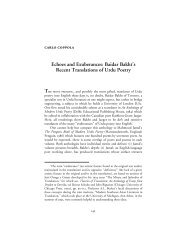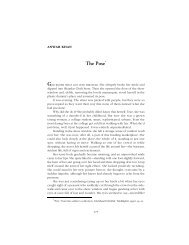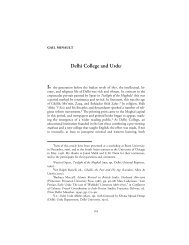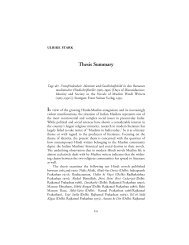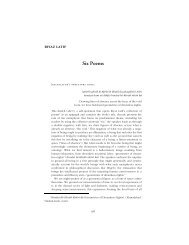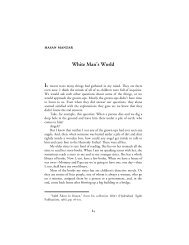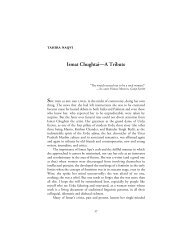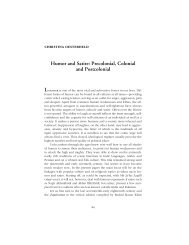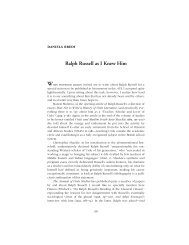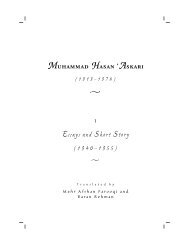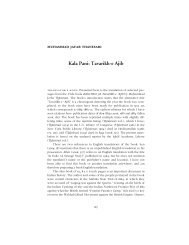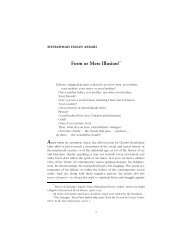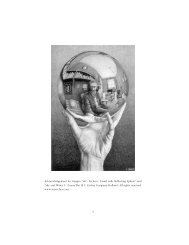Politics, Public Issues and the Promotion of Urdu Literature: Avadh ...
Politics, Public Issues and the Promotion of Urdu Literature: Avadh ...
Politics, Public Issues and the Promotion of Urdu Literature: Avadh ...
You also want an ePaper? Increase the reach of your titles
YUMPU automatically turns print PDFs into web optimized ePapers that Google loves.
84 • THE ANNUAL OF URDU STUDIESPromoting <strong>Urdu</strong> <strong>Literature</strong>: Editors <strong>and</strong> ContributorsThe self-proclaimed aim <strong>of</strong> AA was to work towards <strong>the</strong> progress <strong>and</strong> welfare<strong>of</strong> India by informing <strong>and</strong> educating <strong>the</strong> Indian public through abroad news coverage. Yet at <strong>the</strong> same time <strong>the</strong> paper also assumed <strong>the</strong>function <strong>of</strong> a literary journal. It promoted both poetry <strong>and</strong> prose writing,covered literary events, announced new publications <strong>and</strong> provided aforum for literary debate. While <strong>the</strong> paper attracted <strong>the</strong> contributions <strong>of</strong>some leading <strong>Urdu</strong> literati from outside Lucknow, its role in <strong>the</strong> promotion<strong>of</strong> <strong>Urdu</strong> literature <strong>and</strong> <strong>the</strong> development <strong>of</strong> a modern prose style goesspecifically to <strong>the</strong> credit <strong>of</strong> a number <strong>of</strong> eminent intellectuals among itseditors. According to ¿≥birµ, no o<strong>the</strong>r <strong>Urdu</strong> paper <strong>of</strong> <strong>the</strong> period boastedsuch an illustrious range <strong>of</strong> editors as AA. 48 While some <strong>of</strong> <strong>the</strong>m werealready well-known figures in <strong>the</strong> world <strong>of</strong> literature <strong>and</strong> learning when<strong>the</strong>y joined <strong>the</strong> paper, o<strong>the</strong>rs used AA as a stepping stone in <strong>the</strong>ir futurecareers as publicists <strong>and</strong> writers.Although we have a fair picture <strong>of</strong> <strong>the</strong> various personalities associatedwith <strong>the</strong> editorship <strong>of</strong> AA, to establish a definite chronology <strong>of</strong> <strong>the</strong> paper’seditors remains problematic. Since <strong>the</strong>re was no formal declaration <strong>of</strong> <strong>the</strong>editor on <strong>the</strong> front cover <strong>of</strong> AA <strong>and</strong> since, according to common practice,editorial pieces generally remained unsigned, <strong>the</strong>ir names can only begleaned from references within <strong>the</strong> paper (a difficult task given <strong>the</strong> scarcity<strong>of</strong> extant issues) or from secondary sources. With many contradictingstatements st<strong>and</strong>ing in <strong>the</strong> way, <strong>the</strong> following account can only betentative. 49Equally, given <strong>the</strong> scarcity <strong>of</strong> extant issues for <strong>the</strong> period1859–1875, for <strong>the</strong> time being we can only look at <strong>the</strong> kind <strong>of</strong> intellectualsthat AA was able to attract. To assess <strong>the</strong> nature <strong>and</strong> quality <strong>of</strong> <strong>the</strong>ir contribution<strong>and</strong> <strong>the</strong> way in which <strong>the</strong>ir writings helped to shape <strong>the</strong> distinctpr<strong>of</strong>ile <strong>of</strong> AA remains subject to <strong>the</strong> future availability <strong>of</strong> source material.The first issues <strong>of</strong> AA were almost certainly edited by Munshi NavalKishore himself. However, he was soon forced to delegate this time-consumingtask to o<strong>the</strong>rs. In 1859 Maulvµ H≥dµ ‘Alµ “Ashk” (d. 1865) wasappointed <strong>the</strong> first formal editor <strong>of</strong> AA. Born in a family <strong>of</strong> reputedscholars in <strong>the</strong> qaΩba <strong>of</strong> Bijnor, H≥dµ ‘Alµ “Ashk” had been educated at <strong>the</strong>48¿≥birµ, p. 59.49 The following paragraphs draw largely on ¿≥birµ <strong>and</strong> on Akbar ƒaidarµ,“Munshµ Navalkishår aur Avad^ Akhb≥r,” Nay≥ Daur, Vol. 35, Nos. 8–9 (1980), pp.20–47.



